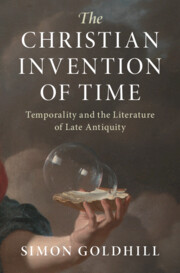Book contents
- The Christian Invention of Time
- Greek Culture in the Roman World
- The Christian Invention of Time
- Copyright page
- Contents
- Acknowledgements
- Abbreviations of Ancient Sources
- Introduction
- Part I
- Chapter 1 God’s Time
- Chapter 2 The Time of Death
- Chapter 3 Telling Time
- Chapter 4 Waiting
- Chapter 5 Time and Time Again
- Chapter 6 Making Time Visible
- Chapter 7 At the Same Time
- Chapter 8 Timelessness and the Now
- Chapter 9 Life-times
- Chapter 10 The Rape of Time
- Part II
- Coda
- Bibliography
- Index Locorum
- Subject Index
Chapter 10 - The Rape of Time
from Part I
Published online by Cambridge University Press: 13 January 2022
- The Christian Invention of Time
- Greek Culture in the Roman World
- The Christian Invention of Time
- Copyright page
- Contents
- Acknowledgements
- Abbreviations of Ancient Sources
- Introduction
- Part I
- Chapter 1 God’s Time
- Chapter 2 The Time of Death
- Chapter 3 Telling Time
- Chapter 4 Waiting
- Chapter 5 Time and Time Again
- Chapter 6 Making Time Visible
- Chapter 7 At the Same Time
- Chapter 8 Timelessness and the Now
- Chapter 9 Life-times
- Chapter 10 The Rape of Time
- Part II
- Coda
- Bibliography
- Index Locorum
- Subject Index
Summary
One of the most surprising expressions that captures a self-conscious positioning in time comes in a remarkable poem in Book 1 of the Palatine Anthology. The poem is not an epigram at all, despite its inclusion in the anthology, but rather a 76-line poem of dedication celebrating the construction of the church of St Polyeuctos in Constantinople. The church was rebuilt in the early sixth century by Anicia Juliana, who came from one of the most distinguished family lines in eastern Greek Christian nobility. Indeed, the original church had been built in the fifth century by the empress Eudocia, who was Juliana’s great-grandmother. Juliana, in her act of rebuilding, was certainly engaging in the familiar competitiveness, aimed at both contemporary and historical rivals, that continued Hellenistic euergetism – the public display of wealth and authority through the sponsoring of public buildings – in order to contribute to the splendid redesign of Christian urban space.
- Type
- Chapter
- Information
- The Christian Invention of TimeTemporality and the Literature of Late Antiquity, pp. 206 - 220Publisher: Cambridge University PressPrint publication year: 2022

